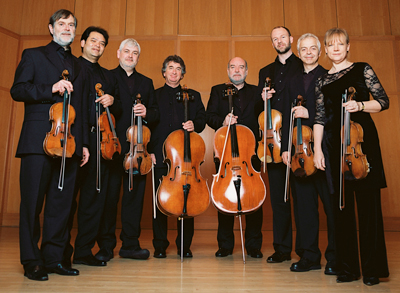by Mike Telin

Announcing the concert, TMA Executive Director Jarrod Hartzler said “the Academy of St. Martin in the Fields is one of the most recognized names in the classical music world, and rightly so. Their performances continually wow audiences, and I know that their Akron performance will be no different.”
The Academy of St. Martin in the Fields was formed in 1959 by a group of eleven enthusiastic musicians with the aim of performing in public without a conductor. Their first three recordings led to a succession of long-term contracts, and The Academy quickly took their place among the most recorded ensembles in history. The Chamber Ensemble was created in 1967 to perform the larger chamber works— from quintets to octets—with players who customarily work together. Drawn from the principal players of the orchestra, the Chamber Ensemble tours as a string octet, string sextet, and in other configurations.
“This is one of our favorite programs so we’re very excited about doing it in Akron,” violinist Harvey de Souza said by telephone from Switzerland. “I think the program really highlights the forte of all of the composers.”
The program will begin with Brahms’s Sextet in G Major, Op. 36. “It’s really an extraordinary thing when you think about composers even as great as Brahms having difficulty writing string quartets — Haydn destroyed it for everybody. But then Brahms comes along and writes for the string sextet like nobody else. I absolutely adore the G major Sextet and it is still for me one of the most rewarding pieces to play. When you come to the end of the journey, you’re always filled with joy. I’m continually amazed by how Brahms can makes 6 players sound like a full orchestral string section in some places, yet in places it is so intimate.”
The program will also include two octets, Shostakovich’s Prelude and Scherzo for String Octet and Mendelssohn’s Octet for Strings. “Why is it that all of the great string octets are written by teenagers?” de Souza said. “I believe Shostakovich was 18 or 19 years old when he wrote his, and Mendelssohn was 16. The other great octet that we play is the Enescu, and he was also 18 or 19 when he wrote it. Maybe it’s because when you are a teenager you’re fearless. I do think the Shostakovich and Mendelssohn complement each other very nicely. I’m sure that Shostakovich knew the Mendelssohn Octet incredibly well. And the Mendelssohn is just so great. I’ve played it hundreds of times, and every time I discover something new. It’s a piece that always makes you feel happy inside.”
Harvey de Souza joined The Academy in 1993. Since that time he has not only taken part in the performing end of the organization, but he has also become deeply immersed in the guiding of the organization’s future. He’s quite honored that the mission of The Academy that was established in 1959 has been copied by many other organizations since their founding. Still, de Souza said that it is a challenge fro The Academy to continually reinvent itself.
“I’m on the board of directors, and the business of orchestras is very competitive nowadays. But what I find at The Academy is the attitude that despite the successes and our huge catalog of recordings, ultimately we are only as good as our last performance. I think that is something that always keeps us on our toes. And collaborating with different artists, who come and place different demands on us, I think is a good thing. Another good thing is that The Academy does not work full-time. We work about half of the year and then we can do other things, and we bring those experiences back to the ensemble. We also meet people and can invite them to do a project. It’s all very firsthand and original, not the flavor of the month kind of thing. I think all of this is a very positive.”
What are de Souza’s thoughts about playing without a conductor? “I think it’s incredibly empowering as an orchestral musician. Everybody must lead, so there is a sense of a collective that is very strong. Sometimes in rehearsals this can be time-consuming because if somebody has a strong point to make, they make it. There’s no fear in speaking out.”
Published on ClevelandClassical.com April 28, 2015.
Click here for a printable copy of this article


